7th International Conference of the German Society of Midwifery Science (DGHWi) and 1st Midwifery Education Conference (HEBA-Paed)
German Association of Midwifery Science (DGHWi)
German Midwifery Association (DHV)
08.02. - 10.02.2024, Berlin
About this meeting
- About the 7th International Conference
- About HEBA-Paed
- Editorial team
- Review process
About the 7th International Conference
Editorial
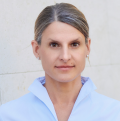
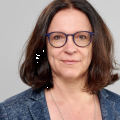
Dear conference participants,
The German Society for Midwifery Science (DGHWi) was founded 16 years ago and is now organising the International Conference for the seventh time, carrying the motto ‘Ways to Sustainability in Midwifery’. The need to exchange ideas on midwifery-related topics remains unbroken: The number of registrations has exceeded all previous ones broadly and we are delighted! For two days, around 250 people will be able to immerse themselves in current (midwifery) scientific topics in German and, with the support of simultaneous translation, in English. The focus will be on lively dialogue, which should bear lasting fruit across all borders.
As a novelty, the 1st Midwifery Education Conference, HEBA-Paed 2024, will open its gates straight after the 7th International Conference. Professors Nicola Bauer and Karolina Luegmair came up with the idea and together with colleagues from the DGHWi Higher Education Section and under the leadership of Professor Lea Beckmann from the German Midwives’ Association (DHV), they conceived and implemented the event. The aim of HEBA-Paed 2024 is to promote exchange, networking, interaction, collaboration and research at professional practice as well as university level. It could hardly be more sustainable, as this combination means that the effort has been shared between the two associations, but also that the long-term benefits have been specifically identified. This is because HEBA-Paed represents the interlinking of practice and theory and therefore appeals to all midwives who contribute to the qualification of midwives-to-be – regardless of where they work.
For both conferences, the contributors prepared scientific presentations, short talks and posters, organised workshops and wrote greetings. All of this can now be found in this conference volume. Firstly, the abstracts make up the main part of the volume. At the back, the review process is presented transparently and you will find biographical information on the authors.
In her keynote speech at the 7th International Conference, Professor Billie Hunter CBE (Commander in the Order of the British Empire) from Wales (UK) ventures a long-term view of sustainable midwifery. She describes how the continuous and sustainable development of the midwifery profession and practice has taken place historically and the challenges that have arisen along the way in order to remain true to the essence of midwifery: the expert support of mothers and their unborn and newborn babies on the ‘journey’ of pregnancy, birth and the postnatal period. From this, she derives recommendations for the current period.
Although the presentations cover a wide variety of topics, they all fit under the sustainability umbrella that Billie Hunter opened up at the beginning and arouse curiosity! With that, you may ask yourself: Can nitrous oxide be considered a sustainable pain therapy in the context of the climate crisis? How are climate (change) and health interlinked for healthcare professionals? What support do women in Germany with and without postpartum depression and anxiety disorder prefer and how does midwifery care for women with a perinatal mental disorder present itself from the user's perspective?
In addition, the nativity story is presented as a lasting experience for midwives, midwifery care is presented from the perspective of health insurance companies and antenatal care is scrutinised more closely. Topics relating to experiences of violence, mental illness and trauma, as well as coping with them, findings on GDM gestational diabetes, second opinions for caesarean sections, insights into the RESPECT study on the subjective birth experience and person-centred obstetric care round up the programme of speeches, which will be amended by interesting workshops and poster presentations as well as lively inter- and intradisciplinary personal exchanges.
The welcome words at the beginning of the conference are deliberately kept very short. For this reason, you will find inspiring and motivating written greetings from personalities who have been involved in shaping midwifery work for many years. These include Professor Melita Grieshop, for the Protestant University of Applied Sciences Berlin (EHB) and Viktoria Vivilaki, President of the European Midwives' Association, Ulrike Geppert-Orthofer, President of the German Midwives' Association (DHV), Ilona Strache, First Chair of the German Association of Freelance Midwives (BfHD), Ursula Jahn-Zöhrens, Deputy Chair of the Society for Quality in Out-of-Hospital Obstetrics (QUAG), Grit Kretschmar-Zimmer, Chairwoman of the Midwifery Association, Professor Jörg Mehrpohl, Director of Cochrane Germany, Professor Barbara Schmalfeldt, President of the German Society for Gynaecology and Obstetrics (DGGG), Professor Mario Rüdiger, President of the German Society for Perinatal Medicine (DGPM) as well as Professor Wolfgang Lütje, President of the German Society for Psychosomatic Gynaecology and Obstetrics (DGPFG).
The HEBA-Paed 2024 programme includes a keynote speech by Claudia Hellmers on the review and current status of the academisation of midwifery in Germany, a panel discussion on the question of ‘Academisation as universal remedy?’, workshops as well as lectures, short presentations and posters, all of which have a clear reference to pedagogy in the qualification, further education and training of (expectant) midwives. A continuing education certificate will be issued for participation in the pedagogical conference. In addition to the DHV and the DGHWi, seven university locations were involved in the organisation. The presidents of the DHV and DGHWi associations, Ulrike Geppert-Orthofer and Professor Barbara Fillenberg, have taken on the patronage of HEBA-Paed and are also involved in its development.
Each conference opening is preceded by months of planning involving countless steps. Our venue, the Protestant University of Applied Sciences Berlin, succeeded in creating a solid infrastructure and at the same time a pleasant atmosphere that enabled the many interested parties to participate in person or virtually. On behalf of the Executive Board, we would like to thank Professor Melita Grieshop and her team at EHB and, on behalf of the entire university management, Professor Sebastian Schröer-Werner for their excellent planning, extensive and multi-layered support and flexibility!
The organisation of the congress is carried out by the members of the executive committee, the office and many other volunteer members of the DGHWi. They all worked tirelessly to organise all the major tasks and every little detail. We would therefore like to thank everyone who was involved! In particular, we would like to thank Elke Mattern, Julia Steinmann, Judith Schümann, Gudrun Römer, Neeltje Schubert, Antje Grünert, Lucia Stanzel and Heike Saalmann for their outstanding work.
We are very much looking forward to meeting you all in person in Berlin or online! We wish you a pleasant time at the congress and many new, exciting impressions! Elke Mattern M.Sc., together with Judith Schümann and Gudrun Römer B.Sc., has produced this successful conference proceedings, which you can now obtain digitally at www.egms.de/en/meetings/dghwi2024/.
Yours sincerely,
Prof Dr Barbara Fillenberg
President of the DGHWi
Dr Astrid Krahl
Vice President of the DGHWi
Editorial appendix
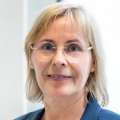
The DGHWi celebrates its 15th anniversary!
I do remember the formation of the DGHWi very well. I was living with my husband and my sons – 19, 6 and 3 years old – in Berlin. My 40th birthday was approaching and after many years as a midwife, working in the labour room as well as freelance, I felt the need to learn more and become more professionally involved in the work of midwives. My husband and parents assured me of their support, I resigned my placement at the labour ward and started studying medical education science at the Charité.
From that time on, I absorbed everything that had to do with the professionalisation of the midwifery occupation and the founding of the DGHWi reinforced this spirit of optimism. I had the proud feeling that experienced colleagues, for whom I felt awe, were doing pioneer work and laying foundations that would later bear fruit.
And that has come true today. So much has been achieved! The board members have worked tirelessly to ensure that today we not only have an established journal and regular and even international conferences. Above all, it has been achieved that midwifery science contributes to improving the care of women and families in German-speaking countries through research and guideline work and is heard in health policy. All midwives in Germany, Austria and Switzerland would like to thank every past and present honorary board members and other contributors. You have done a great job and have made a lasting difference to midwifery science beyond Germany, helping it to gain respect and reputation.
Let us celebrate you today, you great women!
Professor Sabine Striebich
Institute for Health and Nursing Sciences
at the Martin Luther University Halle-Wittenberg
Words of welcome 1–10
#1 2024 EHB
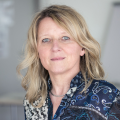
Dear colleagues, guests, and speakers,
With great joy, I invite you to participate in the 7th International Conference of the German Society of Midwifery Science at the Protestant University of Applied Sciences Berlin. Both the Midwifery Science Department and the university administration are delighted that the conference is taking place on the campus of EHB, located in the otherwise very green Zehlendorf.
The conference theme – ways to sustainability in midwifery – immediately appealed to us. However, when approaching this topic that has not been discussed extensively yet, we quickly faced the following question: What exactly is sustainability in midwifery?
Since April 2023, the 5th semester of our Midwifery Science programme has been exploring this question in a student research exercise from various perspectives: from sustainable breastfeeding promotion and sustainable learning to sustainable working conditions and sustainable cooperations in foreign aid.
Throughout their qualitative and quantitative research endeavours, our students have gained many exciting insights into sustainability in midwifery. And as is often the case in research, at the end of this research process, we find ourselves facing more questions than at the beginning of the project, gradually learning more about the phenomenon of sustainability in maternity care.
Therefore, I wish all of us today that over the course of the following two days, we obtain new answers to our questions about sustainability in midwifery, engage in many inspiring discussions, and leave the conference with numerous new research ideas and questions to pursue. This way, the 7th International Conference of the German Society of Midwifery Science can have a lasting impact on our evidence-based midwifery practice and on our research in midwifery and obstetrics.
In line with this, the Science Council – in its paper Perspectives for the Development of Health Professions – has called for the first time that midwifery science develops its own research agenda and is involved in committees deciding on the allocation of research funds. These are also signs that our previous work in midwifery research is showing a sustainable impact for the future of our profession.
Let us build on this together over the coming two days, let us share our ideas, exchange thoughts, and network to improve the quality of our work and, consequently, the care of women and families in the spirit of sustainability.
I am delighted to be welcoming you in Berlin!
Prof. Dr. Melita Grieshop
Head of the Midwifery Science Programme at the Protestant University of Applied Sciences Berlin (EHB)
President of the Midwifery Scientific Departmental Conference (Hebammenwissenschaftlicher Fachbereichstag e.V. – HWFT)
[photo credit: ©F.v.Ploetz]
#2 2024 EMA Viktoria Vivilaki
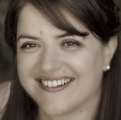
Ladies and Gentlemen,
I am honoured to write a welcome address for the International Conference, exploring the intersection of sustainability, midwifery, and cutting-edge technology, in particular the transformative potential of artificial intelligence (AI) and machine learning (ML) in shaping the future of maternal healthcare. Let us embark on a journey that not only emphasizes the environmental aspects of sustainability but also delves into the enduring strength and resilience of the midwifery profession.
In the context of Europe, the European Midwives Association (EMA) stands as a beacon, uniting midwives from diverse backgrounds to collectively champion excellence in midwifery. This association advocates for the rights of midwives and ensures the highest standards of care for women and newborns across the continent. As midwives entrusted with a pivotal role in maternal and newborn health, our practices should mirror a commitment to sustainability on multiple fronts.
To advance midwifery science sustainably, our focus must be multi-faceted. Continuous education and professional development emerge as paramount, ensuring midwives are well-informed about the latest evidence-based practices. Furthermore, fostering research initiatives and collaboration at the European level is essential to contribute valuable insights to the global body of midwifery knowledge.
Our commitment to sustainability extends to acknowledging and addressing the challenges faced by midwives across different regions of Europe. This includes advocating for equitable access to education and resources, fostering a supportive working environment, and championing policies that recognize the indispensable role of midwives in healthcare systems.
As we pivot to the transformative potential of AI and ML in midwifery, our research goes beyond showcasing quantitative outcomes. It seeks to establish a holistic underpinning philosophy aligned with the principles of sustainable healthcare development. At its core, this transformative approach aims to revolutionize midwifery practices by enhancing quality, efficiency, and accessibility while minimizing environmental impact and resource strain.
The integration of AI-enabled diagnostic algorithms, boasting an impressive 92% accuracy, signifies a paradigm shift in precision and timely identification of maternal health conditions. This not only contributes to positive perinatal outcomes but also aligns with sustainability principles by reducing the need for unnecessary tests, minimizing healthcare-related waste, and optimizing resource utilization.
In the realm of personalized women care plans, the AI-optimized approach showcases a 20% increase in positive perinatal outcomes, fostering a philosophy centered around individualized and tailored healthcare. This personalized approach aligns with sustainability by acknowledging the unique needs of each expectant mother, optimizing resource use, and minimizing the ecological footprint of healthcare practices.
Our commitment to efficiency and cost-effectiveness is evident in AI-driven resource allocation strategies, demonstrating a 30% reduction in unnecessary procedures and a 15% decrease in overall resource utilization. This philosophy encourages a mindful and responsible use of healthcare resources, aligning with sustainability principles that advocate for a balance between meeting current needs and preserving resources for future generations.
The integration of AI-powered telehealth platforms further underscores our commitment to accessibility, particularly for marginalized communities. The resulting almost 40% increase in remote consultations not only enhances healthcare access but also embodies the philosophy of inclusivity, ensuring that all expectant mothers and families, regardless of geographical location or socioeconomic status, can benefit from advanced midwifery care.
In essence, our underpinning philosophy in integrating AI in midwifery is rooted in sustainability, emphasizing precision, personalization, efficiency, and accessibility. By embracing these principles, we envision a future where midwifery practices not only advance technologically but also contribute to a more sustainable and equitable healthcare landscape for expectant mothers and families in Europe and globally.
I am looking forward to the International Conference of the German Society for Midwifery Science and am happy to come to Berlin for it.
Professor Viktoria Vivilaki
President European Midwives Association
#3 2024 DHV Ulrike Geppert-Orthofer
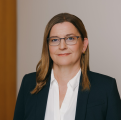
Dear colleagues, dear researchers, dear midwives-to-be,
We midwives can be proud! We have only recently turned into an academized discipline. Our research field is still being developed in Germany and we are looking forward to the 7th International Conference of the German Association of Midwifery Science - a high-calibre platform for scientific exchange where midwives and other people interested in midwifery are brought together. Participants receive first-hand evidence-based findings from midwifery science. Together, researchers, practitioners and professional politicians develop further questions and, in the spirit of maieutic, solutions in a direct and individual exchange. With that, the participants of this conference take the knowledge, inspiration and motivation they gain, back to their professional practice. They are multipliers and expand the work of midwives and obstetrics.
The title of this symposium could not have been chosen more aptly. ‘Ways to sustainability in midwifery’.
Midwives make a major contribution to sustainability if we are allowed to do so. If the healthcare system creates employment conditions that allow midwives to remain in the profession and thus ensure midwifery care. And if midwives can then use their core competences, namely physiological obstetric care with a focus on women's resources, which sustainably strengthen the well-being of women and families. Midwifery work prevents unnecessary interventions that are also unsustainable for the environment.
The role of midwives for families in the touching stage around birth should not be underestimated. Their counselling has an influence on important decisions in this segment of life that can contribute to sustainability. But we will also face new challenges, such as extreme weather events, heat protection or migration movements, which will impact and change our work.
Becoming more academic, we have the opportunity to contribute knowledge that midwives have been carrying with them for a long time to the scientific and professional policy debate. We also have the chance to discover new things and evolve even further. This also gives us a responsibility to contribute to important social matters and help bring about change. Sustainability concerns us all!
I would therefore like to thank the DGHWi for prioritising this important topic. It makes clear what an important contribution the professionalisation of midwifery makes to social developments. Chapeau!
Ulrike Geppert-Orthofer
President of the German Midwives’ Association
[photo credit: ©Deutscher Hebammenverband_Offenblende_Markus Braumann]
#4 2024 BfHD Ilona Strache
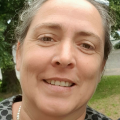
Dear midwives, esteemed colleagues,
It is a great pleasure for me to be able to address a few words of welcome to you on behalf of the BfHD on the topic of sustainability in midwifery. Sustainability not only plays a role in our daily work with concrete environmental protection measures - sustainability must be a central factor for the future of our society: Today, the challenges for the healthcare sector are extremely complex. It is more important than ever to promote sustainable practices and contribute to the well-being of young families.
Midwifery is by nature a sustainable activity. Accompanying pregnant women, women giving birth and young families through the crucial phases of life requires not only professional know-how, but also a conscious attitude towards the environment and our resources. With this in mind, I would like to encourage you to shape your daily practice with a focus on ecological and social responsibility. Science is in demand here, and therefore sustainability is the focus of this international conference.
A central aspect of sustainable midwifery is reducing the ecological footprint. I'm not just thinking of our paper consumption, which is decreasing due to digitalization, but also of the decisions we make regarding medical products, consumables and our mobility. It is important to use more environmentally friendly materials and to integrate resource-saving methods into our daily work.
Another focus is on promoting social sustainability. Midwives play a key role in the field of midwifery and can help to strengthen the freedom of choice and autonomy of those giving birth. Sustainable midwifery work therefore also means supporting women in their individual decision-making process, respecting their needs and building a trusting partnership. In this regard, it is important that we continue to educate ourselves and to stay up to date in order to be able to offer women the best possible care and support.
Promoting sustainability in midwifery also requires a conscious look at the social and economic conditions under which we work. In particular, the working conditions of midwives should be designed in such a way that they enable a long-term, fulfilling professional practice. This includes appropriate wages, good working hours and a supportive work environment. By fighting for better working conditions for freelance midwives, as the professional association, we not only contribute to the sustainable development of our own profession, but also set an example for a fairer and more solidarity-based society.
Overall, implementing sustainability in midwifery requires a holistic approach. We should be aware that every decision we make has an impact on the environment, society and future generations. Let's work together towards a sustainable future in which every woman giving birth receives the best possible support during pregnancy, birth and the postpartum period. May our collaboration always be characterized by sustainability, respect and empathy.
With kind regards,
Ilona Strache
First chairwoman of the Association of Freelance Midwives in Germany
#5 2024 QUAG Ursula Jahn-Zöhrens
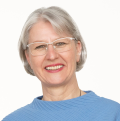
Dear colleagues and student midwives,
I am delighted to be able to write some introductory words on behalf of the Society for Quality in Out-of-Hospital Midwifery (QuAG) to the 7th International Conference of the German Society for Midwifery Science.
This conference is entitled ‘Ways to sustainability in midwifery’. The sustainability of midwifery work has been assessed since 1999 with the help of data collection from homebirths and births in midwife-led facilities. The purpose of midwifery is to support women, newborns and their families in obtaining a good foundation for the beginning of life. Pregnant women who experience a physiological pregnancy, women giving birth who experience their strength during labour, women who have recently given birth who can enjoy getting to know their newborns in a protected environment are the basis for a strong and peaceful community.
But which factors are particularly important here? How is sustainability measured through midwifery work? And what do midwives need to be able to practise their profession in good health for a long time? Because that is also sustainable.
The QuAG survey questionnaire for homebirths and births in birth centres asks about parameters that allow conclusions to be drawn about what is beneficial for sustainable support during a birth.
The QuAG questionnaire for homebirths and birth centre births asks for parameters that allow conclusions to be drawn about what is advantageous in terms of sustainable birth support. Preventive examinations during pregnancy, coupled with the woman's self-assessment, lead to a shared decision when choosing the place of birth. This in turn is the basis for a positive attitude towards the birth process. Recognising the wishes of the woman giving birth and activating her resources allows a successful transformation of a woman during the birth process, regardless of the mode of birth. And if the postpartum period is subsequently recognised as a reorientation for all those involved, this enables the parents and their family to develop a sense of sovereignty that supports the trusting development of the child. This is sustainability for an entire society. QuAG’s data and figures can be used to illustrate the sustainability of midwifery work or to identify weaknesses that can be minimised or circumvented through evidence-based action.
Midwives need sustainability in their professional practice. The profession must be practised in an atmosphere that recognises knowledge, allows reflection on one's own actions and enables recovery. Keeping midwives in the profession is sustainable. Midwives choose new models of care in order to find better working systems. These must also ensure the transfer of knowledge. Supported by research findings, homebirth midwives and birth centre midwives strengthen our next generation and encourage reflective action. For every profession, promoting the next generation is the biggest project in terms of sustainability.
We would like to thank the DGHWi board and all those responsible for the diverse programme, which imparts knowledge and supports reflection!
Ursula Jahn-Zöhrens
Deputy Chairwoman of the Society for Quality in Out-of-Hospital Midwifery (QuAG) e.V., January 2024
#6 2024 HGH Grit Kretschmar-Zimmer
Ways to sustainability in midwifery – an important topic!
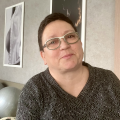
After receiving the request for a greeting, I immediately began to scrutinise my own work from this perspective. We midwives work in such a colourful and diverse way that there are certainly many different possibilities for each of us. I see small and large potential adjustments. In urban centres and large cities, midwives have long been using public transport. Small electric scooters are gaining ground for our mainly outreach work when public transport is not available. Cargo bikes are conquering our lives – in other words, the mode of transport alone is changing for the better.
Another aspect is consumables. I remember when I was a young midwife, travelling with a large bag of sachets and medicines - the rethink started a long time ago. Avoiding waste in our own work, educational work on the topic in the families we care for, all of this is not limited to deciding which type of nappy to choose. And these are just two small examples.
We midwives support people in a phase of life in which sustainability is a major issue, sometimes becoming an issue for the first time ever!
Releasing your own children into the world definitely changes your view of them – and we don’t see much good in that at the moment. Our greatest asset is the trust that the families in our care have in our expertise, coupled with the sensitive phase of life. We shouldn’t let that go to waste!
But our advisory voice also carries – lasting – weight. Who of us hasn’t experienced mothers remembering a very special piece of advice years later? This fills us with joy and carries great responsibility.
Midwifery work starts at the beginning of life, a perfect point for laying the foundations. We have to set an example in order to be credible, which of course also changes our own experience. We take knowledge with us from every care, change our perspective a little, learn and pass on what we have learnt. Perhaps I'm taking a perspective that is too narrow for the term? I very much hope that this event here in Berlin has broadened our view! The approaches from science and research need to be considered together with practical aspects of life, the everyday life of our work. That’s why we have conferences like this, meeting places for bright minds, which then spread the wind of change for those who were unable to attend. This is sustainable again!
As a non-profit organisation, Hebammengemeinschaftshilfe e.V. tries to support midwives on a small scale. We look for solutions for colleagues in need through no fault of their own, promote further training and thus make a small contribution to keeping midwives in the profession. The circle is complete.
Grit Kretschmar-Zimmer
1st Chairwoman of the HGH e.V.
#7 2024 Cochrane
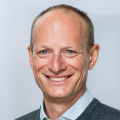
Ladies and Gentlemen,
Evidence-based midwifery practice – this is what the international congress of the German Society of Midwifery Science has stood for since the first meeting in 2011, back then under the motto ‘Science – a pillar of midwifery’.
As the German representative of the international Cochrane network, we are of course very pleased that looking at the current state of scientific evidence has become so commonplace among midwives. For 30 years now, Cochrane has been committed with its systematic reviews to ensuring that decisions in all areas of healthcare can be based on the best possible scientific evidence. In fact, systematic reviews in the field of pregnancy and childbirth were one of the first focuses of the Cochrane Collaboration when it was founded in Oxford in 1993.
This year’s conference focus ‘Ways to sustainability in midwifery’ also is close to our heart. Both topics are connected because scientific evidence also plays a key role in designing sustainable practices in midwifery. Integrating research results into practice enables midwives to improve their methods of care also in terms of sustainability, to make evidence-based decisions and to maximize the safety and satisfaction of the women and families they care for. This evidence base strengthens midwifery and helps to make it more transparent and trustworthy.
We live in a time in which healthcare and the demands on midwifery are constantly changing. This requires a willingness to further training and to adapt practice to new findings. This year's congress offers an outstanding opportunity to expand knowledge, exchange experiences and share best practices.
I would like to encourage all participants to actively participate in the discussions and workshops and thus help shape the future of midwifery. Together like this we can explore ways to sustainability and underline the importance of scientific evidence for this profession.
I wish all participants two productive and inspiring days in Berlin. May the exchange help to make midwifery more sustainable and to ensure the best possible care for mothers, newborns and families.
With kind regards,
Prof. Dr. med. Jörg Meerpohl
Director Cochrane Germany
#8 2024 DGGG
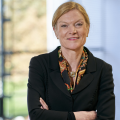
The lives of newborns are significantly influenced by climate change. A child born today will face existential threats due to food and water shortages in many regions of the world, driven by extensive global warming. Furthermore, the health impacts of climate change affect the entire society.
Consequently, sustainability is relevant for all healthcare professions. Even simple measures can be sufficient to improve our ecological footprint, such as reducing single-use packaging, cycling, waste separation, or engaging in discussions with partners in climate protection. However, this requires a collective shift in our thinking. It is our shared responsibility to ensure sustainable healthcare for women, pregnant individuals, birthing people, and newborns.
Generally, it is important to act proactively and optimise medical interventions. We should not hesitate to change habits and embrace new innovations. It is worthwhile to look beyond our own practice areas and interests and find global solutions. By sharing knowledge and resources, we can contribute to improving maternity care worldwide and promoting its sustainability.
The 7th International Conference provides an opportunity to actively participate in important discussions and be inspired to take concrete steps to promote sustainable practices in midwifery. It is our shared responsibility to collaborate effectively, conduct research, and approach policymakers with targeted solutions.
Effective collaboration with mutual respect, diverse exchange, good communication, and coordinated action is crucial for midwifery and obstetrics – especially considering the significant topic of sustainability. I wish all participants the ability to implement these principles both during the conference and in their professional environments.
Prof. Barbara Schmalfeldt
President of the German Society of Gynaecology and Obstetrics (DGGG)
[photo credit: ©DGGG e.V. Sascha Radtke]
#9 2024 DGPM
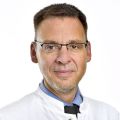
Dear Attendees of the 7th International Conference of the German Society of Midwifery Science,
your annual conference takes place at the Protestant University of Applied Sciences in Berlin under the motto ‘Ways to sustainability in midwifery’.
As president of the German Society for Perinatal Medicine it is my great pleasure to convey to you our society's best wishes.
Securing adequate and contemporary care for pregnant people, newborns, and their families constitutes the core of our shared work.
Accomplishing this goal to the satisfaction of all parties involved requires not only interprofessional and interdisciplinary teamwork, but also close trans-sectoral cooperation.
Considering topics such as the ‘decline in birth rates’, ‘staff shortages’, ‘political frameworks’, and ‘developments in the field’, we currently face the great challenge of maintaining quality care at a nationwide level as well as ensuring centralised maximal care. Simultaneously, all those involved in perinatal care are called upon to consider sustainable and future-oriented solutions.
The development of structures and offers in perinatal care requires a solid data base with the emphasis on evidence as opposed to eminence. I therefore congratulate you that here at your annual conference you present innovative research approaches, discuss results of scientific studies and debate their transfer into clinical practice. Only in this manner, and by working interdisciplinarily, will we be successful in creating optimal health care structures, in enabling sustainable personnel policies and in ensuring nationwide access to healthcare for pregnant people, newborns, and their families in the next decade.
In this spirit, I wish all conference attendees creative collegial exchanges and I look forward to continue working in even closer cooperation as scientific expert associations.
I remain yours truly,
Prof. Dr. Mario Rüdiger
President of the German Society for Perinatal Medicine
#10 2024 DGPFG

Dear congress visitors,
The fact that a medical representative of obstetric psychosomatics, has been invited to write a preamble for this congress invitation is symbolic.
Midwifery science in times of academisation has understood that obstetrics cannot exist without psychosomatics as a discipline and as an attitude - today more than ever.
In many places, psychological topics are therefore being given a firm and significant position in research and teaching – a wonderful development that is certainly still ongoing.
The DGPFG sees itself as a partner here - soon perhaps even acting in the joint creation of a guideline on ‘trauma-sensitive obstetrics’.
It seems particularly important to me to find an answer to the dwindling enthusiasm for obstetrics, especially in a clinical context.
From my teaching work, I know how motivated young midwives are in general, but how frustrated they are by the poor and outdated structures and framework conditions.
Everything needs to be scrutinised once again and, with political support, the entire spectrum of care and treatment surrounding parenthood needs to be realigned and adapted.
Personalisation, respect, appreciation and participation are a few of the magic words. And of course, this process of change thrives on scientific support – a cornucopia for good Bachelor’s and Master’s theses.
The 2024 conference is dedicated to the topic of sustainability. By definition, this is about satisfying the needs of the present in such a way that the opportunities of future generations are not restricted. Obstetrics is therefore the foundation of sustainability, because a good birth in every respect is the starting point for satisfying our most important needs in terms of bonding, pleasure and self-worth. When ‘nurtured’ in this way, resilience is created against greed, narcissism and populism as the source of all our global problems, which could not only limit the opportunities of future generations, but simply destroy them.
Even if obstetrics alone cannot save the world, its importance is underestimated and midwives have a key role to play in ensuring this vital form of sustainability.
In this spirit and with this in mind, I wish you all a lively exchange and, above all, personal encounters at a face-to-face congress.
Dr. Wolf Lütje
President DGPFG
Keynote
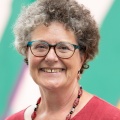
Sustainable midwifery: taking the long view
In this lecture, I will explore the sustainability of midwifery practice, taking a broad view that considers historical and global perspectives. Drawing on the early 20th century records of a Welsh midwife, Sarah Thomas, I will explore the ways in which midwives have ensured the continuation of their practice and profession over time, often against significant challenges. It seems that midwifery has been able to evolve whilst staying true to its essence: providing skilled support to women and their babies through the childbirth journey. I’ll conclude by reflecting on what midwives can learn from history, and how the past resonates with current day challenges.
The keynote speech will be given by Professor em. Billie Hunter CBE from Wales (UK). She is Emeritus Professor of Midwifery Science at Cardiff University, Wales, Visiting Professor at Surrey University, UK, and Associate Professor at the University of Technology Sydney, Australia.
Billie has been a midwife for over 40 years and was involved in education and research from 1996 until her retirement in 2022. She has published widely and is internationally recognised for her research into the emotional aspects of midwifery, including studies on emotional labour, stress and resilience.
Billie Hunter led the development of the WHO Collaborating Centre for Midwifery Development at Cardiff University, which works with the WHO to strengthen midwifery education and practice in the European region and globally. She was awarded the CBE (Commander in the Order of the British Empire) in June 2018 in recognition of her services to midwifery and midwifery education in the UK and Europe.
About HEBA-Paed
Editorial
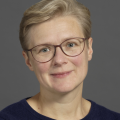
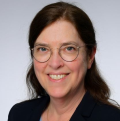
Dear conference participants,
HEBA-Paed is a conference on pedagogical work within midwifery education, taking place for the first time in Germany. The idea for this conference arose from a discussion between Professor Karolina Luegmair and Professor Dr Nicola H. Bauer, spokespersons for the Higher Education Division of the German Society for Midwifery Science (Deutsche Gesellschaft für Hebammenwissenschaft – DGHWi), and Professor Dr Lea Beckmann, Advisor for Education of the German Midwifery Association (Deutscher Hebammenverband – DHV). The joint orientation of the professional association and the midwifery association was an important cornerstone of this conference.
We are delighted to have received so many interesting and informative educational submissions.
The keynote speech will be held by the first professor of midwifery in Germany, appointed in 2009. Professor Dr Claudia Hellmers (Osnabrück University of Applied Sciences) will take us on a journey from the beginnings of the transition from a diploma midwifery training to an academic degree to the current state of 46 programmes, primary qualifying bachelor's degrees in Germany in 2024.
Subsequently, you will have the chance to attend by contributions on practice (guidance) concepts and the conceptualisation of innovative learning and assessment formats. Topics on practice 'mentoring' include hospital and community placements as well as other settings, the student perspective. However, new methods of practice teaching, including the provision of innovative digital learning formats are also covered. Furthermore, these are addressed by contributions on the design of learning and assessment formats. In addition, there are contributions on simulation training and continuing professional development (CPD). There will be plenty of time and room for discussion after the presentations and between sessions, with food and drink provided.
After lunch, an interactive panel discussion will focus everyone's attention on the question of academic training as a universal remedy for the midwifery profession. The panel will include representatives from practice (midwifery and obstetrics), student midwives, Mother Hood as service user representatives and both academic and political representatives. Various tools will be used to effectively involve the audience in the discussion.
The afternoon workshops will focus on new methods in practical and theoretical training, including digital methods. Additionally, there will be a presentation on new findings in health literacy and competence. The workshops will be interactive and conducted in small groups. In addition, there will be poster presentations and an open exchange with the Advisor for Education of the German Midwifery Association and a university representative.
We look forward to the first conference on pedagogical work in midwifery studies. Cooperation and feedback from all attendees are crucial for the programme's continuation and development. Please take advantage of the opportunities offered. If the conference is successful, we plan to establish it on a continuing schedule.
This conference was only possible thanks to the contributions of Professor Dr Lea Beckmann, the Advisor for Education of the DHV, and Professor Dr Barbara Fillenberg, the President of the DGHWi. The members of the working group, listed in alphabetical order, were also instrumental: Professor Dr Lena Agel, Emine Babac (M.Sc.), Professor Dr Daniela Kahlke, and Isabel Schwager (DHV), as well as Professor Dr Melita Grieshop, the conference host. We express our gratitude for the constructive cooperation and the organisation of this wonderful conference.
Sincerely,
Karolina Luegmair and Nicola H. Bauer
[photo credits: ©KSH/Bruchhaus und ©MedizinFotoKöln/M. Wodak]
Words of welcome 1–2
#1 DGHWi and DHV
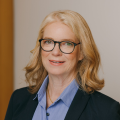

Dear readers,
The transition from diploma training to a university degree in the midwifery profession was completed this year. Over 1,600 students enrolled in the primary qualifying dual study programmes across 55 university locations. This is a significant achievement for both, our profession and for the women and families, midwives care for.
The Midwifery Act and the Midwifery Study and Examination Ordinance now regulate the practical part of the degree programme. In addition, all hospitals with the necessary infrastructure can participate in the qualification of future midwives. However, it is of crucial importance to ensure the quality of both theory and practice training. This requires highly trained practice instructors and mentors who receive regular continuing professional development (CPD). This task is a joint effort offered by universities in collaboration with the German Midwives Association (Deutscher Hebammenverband – DHV) and the German Society for Midwifery Science (Deutsche Gesellschaft für Hebammenwissenschaft – DGHWi).
The DGHWi and the DHV jointly organised the first pedagogical conference at a high academic level, which is hosted by the Protestant College Berlin (Evangelische Hochschule Berlin – EHB). The in-person event, with over 225 participants, is a great success. Moreover, it demonstrates the need for this format and marking the start of a new joint conference series.
We trust you will leave with many new insights, stimulating discussions with colleagues, and suggestions for your practice, as well as a desire for more events in this format.
Sincerely yours,
Lea Beckmann
Advisory Board Member for Education at the DHV
Barbara Fillenberg
President of the DGHWi
Acknowledgements to the organizing team
This event would not have been possible without the great commitment of the organizers. The programme was designed in many online meetings. Many e-mails went back and forth. All decisions were documented. Adjustments were made when it became evident that more colleagues would be coming than we could have imagined.
Special thanks therefore go to:
- Isabell Schwager
- Daniela Kahlke
- Emine Babac
- Lena Agel
- Neeltje Schubert
- Melita Grieshop
- Ideators: Nicola Bauer, Karolina Luegmair und Lea Beckmann
#2 EHB Grieshop

Dear colleagues, dear guests, and esteemed speakers,
The first conference on educational work in midwifery studies (HEBA-Paed) marks another milestone in the process of an academic midwifery profession! This process not only requires the advancement of midwifery science and evidence-based midwifery practice but also demands professionalization and discipline development in the realms of academic and hands-on learning, guidance, assessment, and simulation. I am delighted to welcome you on February 10, 2024, to this special conference at the Evangelische Hochschule Berlin, in cooperation with DGHWi and DHV!
To some extent, this conference follows a good tradition - the annual conference of midwifery educators. For many years, our colleagues at midwifery schools have implemented modern didactic concepts such as problem-based or case-oriented learning and integrated scientific literature into teaching. However, the transition process, which we have been undergoing since at least 2020, must now be consistently addressed in the pedagogical-didactic field and guided towards a specific Didactics for Midwifery Science. In connection with this, teaching and learning must not be oriented towards the economic interests of the healthcare system, questions of interdisciplinary delegation, or feasibility through digitalization. The education of midwives must continue to focus on reflexivity, research-based learning, evidence-based practice, multiperspectivity, and the needs of women and her families, as well as our students! These characteristics define the high quality of our collaborative educational work at the three learning locations: theory, skills lab, as well as clinical and non-clinical practice.
A few years ago, didactics of midwifery work were only rudimentarily present, and the pedagogical discourse was predominantly conducted at the level of teaching methods. Since the implementation of midwifery studies at universities, this development has gained significant momentum. This is evident in numerous pedagogical-didactic publications, research, thesis works, and the exciting submissions for this HEBA-Paed conference.
Let us seize this valuable momentum and expand and intensify the pedagogical-didactic discourse with this conference. Both the Midwifery Science team and the Rectorate of the Evangelische Hochschule Berlin warmly invite you as stakeholders in midwifery studies in theory and practice, as well as the students, to participate in this 1st Midwifery Education Conference.
Professor Dr. Melita Grieshop
Programme Director of Midwifery Science B.Sc. at the Evangelische Hochschule Berlin (EHB)
President of the Midwifery Scientific Departmental Conference (Hebammenwissenschaftlicher Fachbereichstag e.V. – HWFT)
[photo credit: ©F.v.Ploetz]
Editorial office
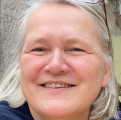
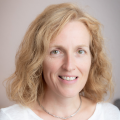
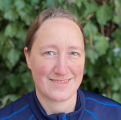
Dear readers,
We are pleased to make available this conference volume for the 7th International Conference of the DGHWi and the 1st Midwifery Education Conference (HEBA-Paed) by the DGHWi and the German Midwives Association (DHV) at the Protestant University of Applied Sciences Berlin, Germany. Different working groups and numerous members of the DGHWi and the DHV are responsible for the realization of the conferences: 1st The organization teams who took on the call for abstracts, the planning and organization of the conferences; 2nd members of the DGHWi and the DHV who organized the review process; 3rd the executive committees who were in close consultation with the conference teams; 4th the staff members of the EHB who prepared everything on-site.
56 abstracts have been submitted for the 7th International Conference including 14 presentations, 3 workshops and 34 posters that formed the conference. The topic ‘Ways to Sustainability in Midwifery’ touches upon many dimensions of the midwife profession and is represented by the different works.
For the HEBA-Paed, 33 abstracts have been submitted. 10 presentations, 8 short presentations and 12 posters will be presented thereof. The call for abstracts seems to have appealed to many individuals who are active in the sense of the conference – as pedagogues in midwifery studies in theory and practice.
We are pleased about the keen interest of the conference participants in issues of midwifery studies. 350 individuals in total will participate in either one or both conferences at the EHB. This supplement of the Journal of Midwifery Science documents the welcoming speeches by befriended associations, institutions and professional societies, all abstracts of the presentations including the keynote, as well as the abstracts of the workshops and the posters in English and German.
For reasons of sustainability the organizational teams decided against a print version. Besides this digital version in PDF format you will have access to this documentation via the GMS online portal ‘German Medical Science’. There, the welcoming speeches and abstracts will be permanently available online and accessible via the following link for free: www.egms.de/en/meetings/dghwi2024/.
In many cases the completed posters (by the respective abstracts) are linked as PDF file in the GMS portal.
The GMS online portal is the interdisciplinary portal of the Association of the Scientific Medical Societies (AWMF). It was established in cooperation with the German Institute of Medical Documentation and Information (DIMDI) and the German National Library of Medicine (ZB MED) and provides free access to high-ranking and quality-assured medical and midwifery research and professional articles, abstracts and statements.
Each individual abstract has a citation at the end that has a ‘DOI address’. This ‘DOI’, which uniquely identifies the abstract, guarantees individual storage for an unlimited period of time. With the DOI, the abstract is located on the Internet and can be accessed directly via the search mask of www.doi.org/ or via an ordinary browser.
We wish you a pleasant and inspiring 7th International Conference and 1st Midwifery Education Conference!
Elke Mattern, Judith Schümann and Gudrun Roemer
Editors of the conference volume
Review process

Dear participants,
All talks, short presentations, posters and, for the 7th international conference workshops also, were accepted for the conferences after submission and review of abstracts. The theme of the international conference ‘Ways to sustainability in midwifery’ and the HEBA-Paed ‘1st conference on midwifery education’ attracted a total of 89 national and international abstracts.
The submission tool of our website was used for a call for abstracts, whereas the review of the abstracts was managed via the online tool Limesurvey.
All abstracts were each anonymously reviewed by two reviewers. The reviewers were asked to take into account the qualifying criteria for the submitted abstracts and to decline to review the abstract if there were personal conflicts of interest. All abstracts were reviewed according to the following eight criteria:
- Does the abstract address a current problem or issue in midwifery science?
- Is the topic clearly justified and research gaps identified?
- Is the objective and/or research question clearly formulated?
- Does the abstract provide information on the study design and is this method suitable for answering the (study’s) objective?
- Are the methods and findings/expected findings presented clearly and concisely?
- Does the abstract discuss a rationale for the significance of the findings/work?
- Does the abstract mention the implications for practice, training and/or future research?
In each of these categories, the reviewer could award between 1 (lowest score) and 5 points (top score). If, due to missing information, it was not possible to provide a score for one of the criteria, a score of 0 points was awarded for this category. Thus, for each submission, with two reviewers, there was a possible maximum score of 80 points.
The presentations, workshops and posters chosen for the programme were selected by the international conference´s steering committee and the HEBA-Paed organisational team. They were supported by the following criteria:
- Contribution to the theme of the conference
- Authors’ willingness to present their study in the recommended format (talk or workshop)
- Format recommended by at least one reviewer as being suitable
- Contributions accepted as presentations have been awarded at least 50 points by the reviewers
For the review process, we looked for academics who would be willing to assess the submitted papers after the ‘Call for Abstracts’ had ended. 30 colleagues answered our request for help and thus, through their contribution to the review process have helped to ensure the success of the two conferences. We would like to thank the following people:
- Nicola H. Bauer
- Barbara Baumgärtner
- Julia Berger
- Annette Bernloehr
- Angelica Ensel
- Hanna Gehling
- Susanne Grylka-Baeschlin
- Claudia Hellmers
- Daniela Kahlke
- Anne Kasper
- Annette Kluge-Bischoff
- Astrid Krahl
- Monika Kraienhemke
- Maike Lammert
- Ute Lange
- Christine Loytved
- Karolina Luegmair
- Mirjam Peters
- Beate Ramsayer
- Rainhild Schäfers
- Martina Schlüter-Cruse
- Gaby Schmidt
- Susanne Simon
- Katja Stahl
- Pia Steinbrück
- Dorothea Tegethoff
- Andrea Villmar
- Kristina Vogel
- Therese Werner-Bierwisch
- Laura Zinßer
Prof. Dr. Lea Beckmann
Deutscher Hebammenverband (DHV), Beirätin für den Bildungsbereich
